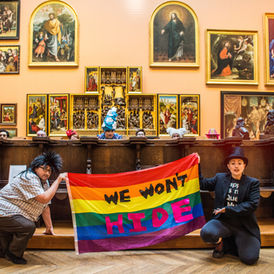"King Kitt: Absolutely-f**king- floorless”",
Miss Rory, Drag Idol Judge, 2019
"International superstar of feminism", Creative Debuts, London
King Kitt- The Paper Dick-tator
Photo collages
Performances


Workshops

"For me being a feminist is not just about women's rights- it is about everyone's rights. The ciswhiteheteropatriarchy is bad for us all, even the cis white hetro patriarchs.
The "King Kitt" works are about toxic masculinity- which I feel creates a series of circumstances that can make men comically manly, dangerously macho and devastatingly vulnerable and the King Kitt character is all of these things. A scrotty, sexy, terminally confused, toxic male at your service... or at his own service... it's quite hard to tell."
Lady Kitt, 2018





Images below of King Kitt performing / running workshops during 2018/19 at:
Saatchi Gallery (London), Reyt Queer Do (Sheffield), Drag Idol (Newcastle), Anti Art Fair (London), Creative Debuts (London), Durham University (Durham), Great North Museum (Newcastle), DAG Collective (Newcastle), Northern Pride (UK), Alphabetti Theatre (Newcastle), Bowes Museum (Co Durham), Middlesbourgh Art Weekender (Darlington& Middlesbourgh)
Image credits: Louise Harvey, Clare Brown, Michael McGuire, Sofia Barton, Sarah & Edwin Grundy-Li and Ndryka Anyika

More equality will, hopefully, create a society where statistics like these below become historical records, not lived realities.
-
Of the 5,965 suicides registered in the UK in 2016, a total of 4,508 were male and 1,457 were female (Office for national statistics, 2017)
-
93.2% of prison inmates in the UK in 2017 were male (HMPPS, 2017)
-
Men are 7.5 times more likely than women to be classed as problem gamblers (Gambling Commission, 2016)
-
In the USA a married father spends on average 6.5 hours a week taking part in primary child care activities with his children. A married mother spends on average 12.9 hours. (National Survey of Family Growth, 2011)
-
Middle-aged men have more heart attacks than women in the same age group. Higher rates of unhealthy habits—including smoking and stress—may be to blame (Harvard Health, 2016)
-
Globally gender Dysphoria is three times more prevalent in males than in females (Health research funding, 2016)
 |  |  |  |
|---|---|---|---|
 |  |  |  |
 |  |  |  |
 |  |  |  |
 |  |  |  |
 |  |  |  |























